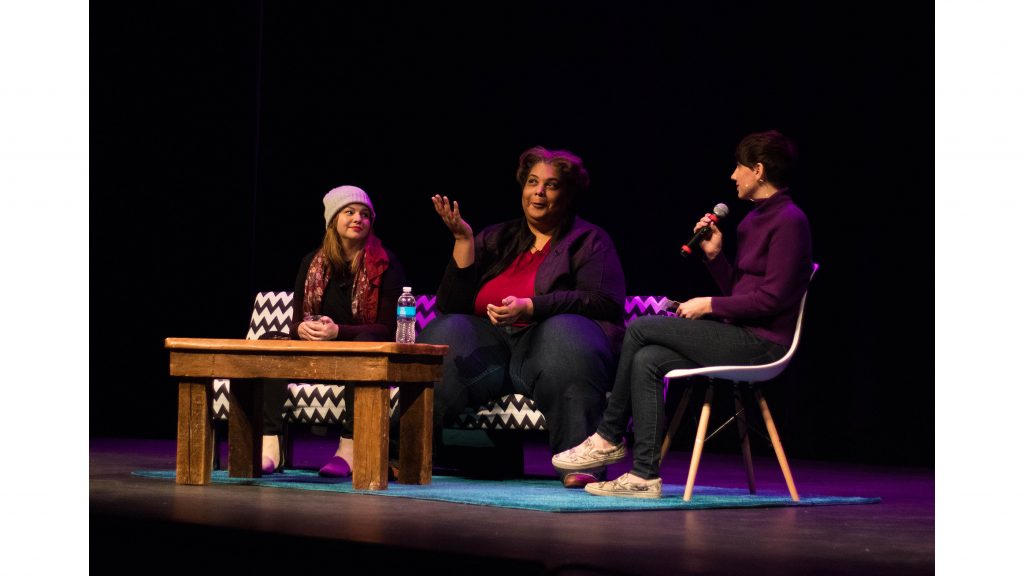Screams and roars elicit throughout The Englert, 221 E Washington. For those outside of the literature community, it would seem like a musical concert was about to take place, but not today. Today Roxane Gay, Amber Tamblyn, and Jessica Hopper step on stage as the claps and screams become more shrill.
Midwest raised renowned author, Gay, and actress turned poet, Tamblyn sit on a sofa with a zig-zag design as culture critic and music writer Hopper sits on a white chair to moderate the conversation.
The three remarkable women were humorous and knowledgeable through their conversations talking about anything ranging from casual encounters on Craig’s List, which is how Tamblyn and Gay jokingly said they met, to imperative advice for young women.
Hopper asked questions that are often overlooked in discussions about women in creative work as Tamblyn and Gay offered multiple perspectives, including advice they received, but gladly disregarded.
“[One of my mentors] always told me I needed to write every single day if I wanted to be a good writer,” said Tamblyn. “It actually stressed me out. I thought there was something deeply wrong with me that I couldn’t do that.”
Dissimilarly, another mentor told Tamblyn otherwise, mentioning to nurture ‘writer’s block,’ rather than fight it.
“It’s just the muse sleeping, and you have to protect it and not think of it as a bad thing, but you have to nurture it,” said Tamblyn.
Gay’s experience was more appalling, in that one editor told her she would have to write about black people in a way that was, in his words, “believable.” To this editor, “believable” included black communities living in ghettos rather than suburbs.
Thankfully, Gay disregarded this advice.
Hopper, whose been writing with a feminist point of view for several years now, was even given contradicting advice from an editor.
“An editor told me if I should set aside my feminism and view things outside of those lens and just take art or music as it was from this imagined, central, [and] basically white man’s perception,” said Hopper. “[Then,] if I could do that I could write for Spin or The Rolling Stone.
Much to this editor’s dismay, Hopper had been writing for Spin since she was 18 years old, which she expanded on in an interview with The Daily Iowan.
“There was a local paper where I was growing up in Minneapolis, and I didn’t really like how they wrote about one of my favorite bands, [Babes in Toyland], so I wanted to write something that understood this band,” said Hopper. “I was only in 10th grade and didn’t have a lot of writing experience outside of school, so [the local paper] didn’t take me up on my offer.”
Hopper ended up Xeroxing a 40-page publication she and her friends created, and a few months later, she begin writing for national publications, such as Spin.
During the conversation, Gay and Tamblyn also reminisced about their childhoods.
“I would go to the library and take a wagon, fill it with books, and walk home,” Gay said.
As an eleven-year-old actress in Hollywood, Tamblyn had a different take.
“Success was anytime when someone would take me seriously when I was an actor,” said Tamblyn. “I used to say I don’t act for a living, I get rejected for a living.”
Tamblyn recalled audition in rooms filled with predominantly men.
“I would try to present [ideas] to them in a way that made it seem like it was their idea,” said Tamblyn.
As a writer, though, Tamblyn now feels less pressure of having to look a certain way or act a certain way. She gets to be herself.
Not to say writing doesn’t have pressures, especially when Gay has introduced several first-time occurrences within literature.
“It makes me afraid because I don’t want to ‘fuck’ it up,” said Gay. “That kind of pressure makes me want to do my best, then I don’t take risks, and I’m not myself on the page. [I have to tell myself, ‘Okay Roxane you’re the first, but you’re not going to be the last. If you fail it’s not you it’s the system that’s irrevocably broken.”
Fittingly, proceeds for this event were donated to Girls Rock!, an organization determined to bringing creativity to young girls and trans-identified youth through music. They even record their own music on CD’s, which were sold at The Englert after the event and are apparently mostly about cats.



